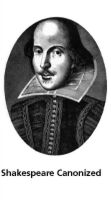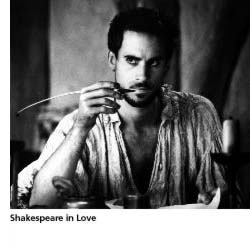
Nearly 400 years after his death, the name William Shakespeare is known by just about everyone who speaks the English language, and his poetry and plays have come to epitomize literary excellence in the canon of English letters. Poet William Carlos Williams, M'06, Hon'52, said that Shakespeare is the greatest university of all. NEH chairman Bill Ferris, Gr'69, wrote that "we understand the human condition better in our own time because he wrote about it so penetratingly in his." So great is his iconic stature that "the bard" singles out Shakespeare alone from the pantheon of English poets.
 But "the slings and arrows of outrageous fortune" seem all the more scandalous when you consider the mean circumstances of London's 1590s theater scene, out of which this "great" and "timeless" literature emerged. This year's Academy Award winner, Shakespeare in Love, went a long way toward bringing Shakespeare back to earth. With some help from Shakespeare scholar Rebecca Bushnell, associate dean for arts and letters in SAS, we briefly take up a few points in the film's light hearted romp on sacred ground.
But "the slings and arrows of outrageous fortune" seem all the more scandalous when you consider the mean circumstances of London's 1590s theater scene, out of which this "great" and "timeless" literature emerged. This year's Academy Award winner, Shakespeare in Love, went a long way toward bringing Shakespeare back to earth. With some help from Shakespeare scholar Rebecca Bushnell, associate dean for arts and letters in SAS, we briefly take up a few points in the film's light hearted romp on sacred ground.
In a local tavern young Will Shakespeare, beset with writer's block and miserable, says to the barman, "Give me to drink mandragora." The line is from act 1, scene 5 of Antony and Cleopatra. The drink is a narcotic, a soporific. Queen Cleopatra wishes to "sleep out this great gap of time" while her lover is away. The barman responds with the question: "Straight up, Will?"
The film's two lines bring into collision the grand world and elevated language of Shakespearean tragedy with a rather ordinary, sex-and-violence tavern scene. "High" and "low" culture are not separate worlds here. Art and art-making are inextricably caught up in the practical, grubby world of business obligations and money making. Philip Henslowe, the indebted owner of the Rose Theater for which Shakespeare writes, makes an improbable arrangement of having a stutterer audition for the part of Romeo. "My tailor. Wants to be an actor. I have a few debts here and there," he summarizes. After being tortured--comically--by an anxious money mogul, Hugh Fennyman, to whom payment is overdue, Henslowe says of the theater business: "The natural condition is one of insurmountable obstacles on the road to imminent disaster."

If Henslowe's characterization is apt for modern day Hollywood, it was even more so for the Elizabethan theater. Play going was a major source of cheap entertainment for the masses (and court amusement for the monarchy), but it was considered vulgar and even dangerous by the city fathers of London. So much so that playhouses were banned from the city. The theater district was situated across the Thames on the bawdy outskirts among the brothels and bear-baiting pits. Shakespeare was an entertainer whose work could be seen only by those willing to rub shoulders with prostitutes, charlatans, and other riffraff such as actors--like Shakespeare himself.
Near the film's end, Henslowe makes his expectations clear: "Let us have pirates, clowns, and a happy ending." It is not only Hollywood that puts pressure on writers for happy endings. As London theater became more respectable, productions of Shakespearean drama were "improved." In 1679, Thomas Otoway wrote a scene near the end of Romeo and Juliet in which the heroine awakens before Romeo's death, and the two conduct a touching and presumably more satisfying farewell duologue. Productions of the play with versions of this added scene were popular for a period of almost 200 years.
Somehow, a writer of plays for an Elizabethan audience whose modern counterpart watches Married with Children ended up at the top of almost everyone's literary canon.
"Strangely enough," says Henslowe of the precarious theater business, "it all turns out well."
"How?" asks Fennyman.
"I don't know," he replies. "It's a mystery."